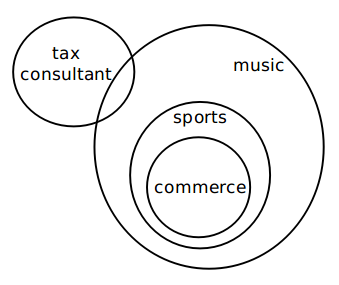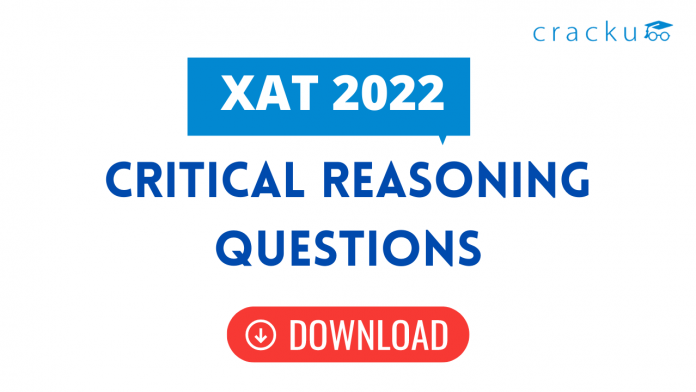Critical Reasoning Questions for XAT 2022 – Download PDF
Download Critical Reasoning Questions for XAT PDF – XAT Critical Reasoning questions pdf by Cracku. Top 10 very Important Critical Reasoning Questions for XAT based on asked questions in previous exam papers.
Download Critical Reasoning Questions for XAT
Get 5 XAT mocks at just Rs.299
Question 1: Read the following paragraph and answer the question that follows:
Indian religious and ethical space is different from that of the western countries. The Vedas, the Upanishads, the Bhagavad Gita, the Ramayana, and the Mahabharata etc. enrich Indian religious and social space. Details of the treatment of human values and Dharmas have a long tradition. They are often compared, contrasted and debated by the characters in the Ramayana and the Mahabharata. In the process, it has given birth to a tradition of dharma, which has been transferred from generation to generation. Ethical discourse was not a one-time affair. From time to time, religious leaders from various regions of India nourished and strengthened the Indian ethical arena. Tiruvalluvar (second century B.C.), Kabir from Uttar Pradesh (fifteenth century A.D.), Nanak from Punjab (fifteenth century A.D), Alvars and Nayanmars of Tamil Nadu (eighth century A.D.), Basaveswara of Karnataka (Twelfth century A.D.), Sri Chaitanya (Sixteenth century) were prominent.
Which of the following assumptions will make the above paragraph redundant?
a) All religious leaders, mentioned in the paragraph, preach the same message and it is transferred from one generation to the next.
b) Western religious spaces do not have details of treatment of principle of Dharma.
c) Ramayana and Mahabharata have made it possible for religious leaders to build the tradition.
d) Western civilizations have been traversed by a different kind of religious leaders.
e) Western ethical and religious space has a long tradition of treatment of human values and Dharma.
Question 2: Choose the most appropriate option after reading the following statements.
I. Business schools are ideally positioned to point out when an action that provides a benefit for an individual comes at a cost to society, but in reality they rarely bother.
2. It is part of the malaise that has befallen the political debate on capitalism, which has been taken over by special interests and people who have no faith in a real market-based system.
3. When governments favours the private sector it is all too often by being “pro-business” rather than “pro-market”, meaning that favourable conditions are provided to particular institutions rather than to institutions broadly.
a) Statements 1 and 2 are necessarily dependent.
b) Statements 2 and 3 are necessarily dependent.
c) Statements 2 and 3 may be dependent.
d) Statements 1, 2 and 3 cannot be independent.
e) All the three statements are necessarily independent.
Question 3: Choose the most appropriate option after reading the following statements.
1.Whether due to haste or design, the new laws are marked by vagueness, leaving officials all down the organization’s bureaucratic chain great latitude in enforcing them.
2.The opacity of the language leaves the law open to manipulation on political grounds.
a) Statement 2 can be induced from statement 1.
b) Statement 1 can be induced from statement 2.
c) Statement 2 can be deduced from statement 1.
d) Statement 1 can be deduced from statement 2.
e) Statements 1 and 2 are independent.
Question 4: The motivation of human beings towards their work is a subject matter that is at once a simple as well as an extremely complicated matter. For a long time, economists, sociologists, as well as psychologists believed that a carrot and stick approach, with monetary incentives playing the role of the carrot, would be sufficient to goad employees towards achieving higher levels of performance. However, a number of recent studies and observations, especially dealing with the open source revolution are placing on the table strong evidence suggesting that monetary incentives are only one part of the entire story of motivation through incentives. In a study conducted by a group of researchers at MIT, it was found that monetary incentives work well only in respect of tasks requiring mechanical skills i.e. those tasks not requiring much use of higher level cognitive abilities (such as memorizing or problem solving). In fact their study showed that setting high monetary incentives for tasks requiring cognitive abilities were more likely than not to produce adverse outcomes. Since this result flew straight in the face of the widely accepted body of knowledge on employee motivation, they conducted multiple experiments in different settings and countries to ensure that it was not a one – off result. The findings were the same in all repetitions of the experiment. These studies appear to suggest that monetary incentives need to be provided only to such an extent as to take the minds of employees off the issue of money and focus on other issues that are necessary to get the job done right. For instance, some experiments have shown that greater autonomy to employees and lowered interference from management (and bosses) is successful in driving the performance of employees working in cognitive skill intensive jobs.
Identify the statement(s) that is (are) logically consistent with the con tent of the paragraph
i. The carrot – stick approach essentially requires the use of rewards to get more of a desired behaviour whereas penalties lead to increased undesirable behaviour.
ii. Expending time and effort on the design of monetary incentives is a wasteful exercise.
iii. The study by the group of MIT researchers was a flawed exercise from the start.
iv. There appears to be a need to reorient the existing paradigm prevalent in incentive design.
v. During the process of designing incentives, one should clearly delineate activities into those requiring mechanical skills and those requiring higher – level cognitive skills and design with separate sets of incentives and penalties for each.
a) i and iv
b) i and v
c) ii and iii
d) ii and iv
e) iv and v
Question 5: As the information on air warfare tasks and stressors was being gathered and scenarios were being developed, a parallel effort ensued to identify a test bed simulation for air warfare teams. To maintain experimental control, it was determined by the designers that choosing a low physical fidelity simulation was acceptable as long as cognitive fidelity in a team simulation was maintained through subjecting soldiers to pressure situations in a simulated combat setting and attempting to ensure that naturalistic decision making of soldiers would not be compromised.
Which of the following statements, if true, weakens the logic of the above passage?
i. A number of studies have shown that high levels of physical stress lead to a weakening of the decision – making capabilities of human beings.
ii. It has been convincingly demonstrated by various studies that human beings by nature are not designed to adapt to high levels of mental stress.
iii. Numerous studies have shown that simulated environments can be designed to be good substitutes for real – life combat situations.
iv. Studies have shown that simulated exercises for armed forces personnel have tended to induce a systematic type of “correct” and common behaviour among the trainees.
v. Officers, when short – listing soldiers for critical operations, pick up battle – hardened soldiers rather than those who have been trained through simulations.
a) i and ii
b) ii and iii
c) i and iv
d) i, ii, iv, and v
e) ii, iii, iv, and v
Question 6: Perhaps this war will pass like the others which divided us, leaving us dead, killing us along with the killers but the shame of this time puts its burning fingers to our faces. Who will erase the ruthlessness hidden in innocent blood?
Which of the following is certainly not implied in the above verse?
a) Killers also get killed in war.
b) Humanity gets divided by war and reunites afterwards in peace.
c) This war is especially ruthless.
d) This war is shameful to the entire humanity.
e) None can obliterate the ruthlessness of this war.
Question 7: Randomness has to be dealt with successfully to ensure a better control over one’s life. Before one can deal effectively with randomness, one must acknowledge its existence.
The above statement implies the following except:
a) Randomness can be dealt with effectively.
b) If one acknowledges the existence of randomness, one will be able to deal with it effectively.
c) One can deal effectively with randomness if and only if one acknowledges its existence.
d) Everyone lives in a random world.
e) If one does not acknowledge the existence of randomness, one cannot deal with it effectively.
Question 8: Media are not just passive channels of information. Not only do they supply the stuff of thought, but they also shape the process of thought. And what the internet seems to be doing is chipping away our capacity for concentration. Which of the following, if true, would most strengthen the argument presented above?
a) Nietzsche was forced to use a typewriter when he started losing his vision. After he mastered the machine, he could type with his eyes closed. It was later found that under the effect of the machine, Nietzsche’s prose “changed from arguments to aphorisms, from thoughts to puns, from rhetoric to telegram style”.
b) One of the effects of the timekeeping instruments has been that we have started deciding on our daily activities based on the clock and not based on our senses.
c) Studies have shown that the essay writing skills of an average 15 – 20 year old, who spends a lot of time browsing the internet, is comparable to what it was among the average 15 – 20 year old, throughout the 1980s and the 1990s.
d) A recent study has shown that the number of people who fall asleep while reading a printed book has increased in the last five years.
e) The ability of the younger judges, who have grown up with ready access to internet, to judge complex and intricate cases, has, on an average, become better as compared to what it was for judges of comparable age profile during the 1920s.
Question 9: When income tax rates are reduced, there is an increase in taxable income, and an increase in
taxable income results in increased total income tax revenues for the government. Which of the following is analogues to the argument above in terms of its logical features?
a) If the city municipal corporation increases taxes on property by 1% it will raise tax revenues, which can be used for garbage disposal management.
b) The Leader of the Opposition at the Parliament argued that a restriction on the import of Chinese manufacturing products will increase the sales of Indian manufacturing products.
c) An advertisement using more than 25 words of text will not be read, and when an advertisement is not read, the product is not sold. Therefore, the fewer words an advertisement has, the more effective it will be in promoting its product.
d) The balance of payment of a country will improve if the country reduces its imports and increases exports.
e) Citizens earning more than 15 lakh rupees per annum pay at an increased tax rate of 40% Citizens earning less than 1 lakh= rupees per annum can be exempted from paying income taxes without decreasing the revenues of the Income Tax Department
Question 10: All who studied commerce enjoy sports. No tax consultant enjoys sports. All those who enjoy sports love classical music.
If the above sentences are true, which of the following also must be true?
a) No one who enjoys classical music is a tax consultant by profession.
b) Every tax consultant enjoys classical music.
c) No tax consultant enjoys classical music.
d) No tax consultant studied commerce.
e) No one who studied commerce enjoy classical music.
Answers & Solutions:
1) Answer (E)
The central idea of the given paragraph is that Indian religious and ethical space is different from that of the western countries. The remaining part of the paragraph explains how Indian religious works placed emphasis on the concept of Dharma. The author is trying to promote Dharma as something unique to the Indian culture. Therefore, any idea that challenges this assumption will make the paragraph redundant. Option E states that the western culture also places emphasis on human values and dharma, taking away the uniqueness of Indian culture. Therefore, option E is the right answer.
2) Answer (B)
The second statement starts with the pronoun ‘it’. The third statement talks about the government favouring private sector. Therefore, the ‘it’ in the second statement most probably refers to the favours extended by the government. Sentences 2 and 3 are dependent. Sentence 1 talks about business schools and is unrelated to the remaining 2 sentences (which talk about the government and politics). Therefore, option B is the right answer.
3) Answer (E)
Statement 1 talks about ‘the new laws’ being vaguely worded. Statement 2 talks about ‘the law’ being open to manipulation due to its language. Sentence 1 and 2 are unrelated since 1 talks about a set of new laws (plural) and 2 talks about the law (a particular law that should have been introduced in some other statement, singular). Therefore, the 2 statements are independent and hence, option E is the right answer.
4) Answer (E)
The paragraph states that though monetary incentives are necessary for an employee, the importance of motivations such as greater autonomy cannot be overstated.
Hence, option E is the correct answer.
5) Answer (C)
The main argument of the paragraph is that the naturalistic decision making capabilities of individual soldiers should not be compromised.
Statement i mentions the weakening of the decision making ability. So, statement i weakens the argument.
Statement iv also mentions about common behaviour among the trainees which defies the individualism.
Hence, option C is the correct answer.
6) Answer (B)
In the given verse, there is no mention of peace and what happens after war. Thus, option B can certainly be not implied.
Hence, option B is the correct answer.
7) Answer (B)
The paragraph states that if one wants control over his own life, he has to deal with randomness. Also, one has to accept the existence of randomness to deal with it effectively. Let’s take a look at the options one by one. We will check each option by assuming it to be false. If falsifying the option overturns the conclusion of the paragraph then the option is implied by the paragraph.
Option A- If option A is not true, then the statement is overturned. If randomness cannot be dealt with effectively then we cannot do that to exert control over our life. Hence, option A is implied.
Option B – If we assume this statement to be false, then the paragraph is not affected. If, say, not just acknowledgement of randomness but other skills are involved in dealing with randomness. Then the statements of the paragraph still hold true. Hence, B is not implied by the paragraph.
Option C – If this statement is not true, then the second statement of the paragraph is overturned. Hence, this is implied.
Option D – If this statement is not true, then those who dont live in a random world can exert control over their life without dealing with randomness. Hence, first part of the paragraph is overturned. Thus, this is implied by the paragraph.
Option E – If this statement is not true, then the second statement of the paragraph is overturned. Hence, this is implied.
Hence, only option B is not implied.
8) Answer (D)
The argument is that the internet is affecting our ability to concentrate in a negative way. Hence, any activity which requires a certain amount of concentration might increasingly become difficult to pull off for average humans. This gets strengthened if it gets seen that more people have started falling asleep while reading printed books, traditionally an activity which requires a good amount of concentration/attention span. Falling asleep when doing the task is symptomatic of lack of required concentration.
9) Answer (C)
The given situation talks about a benefit getting reaped by a counter-intuitive step. If Govt. wants increased tax revenues then a straightforward suggestion would have been to increase tax rates. Any suggestion to reduce tax rates would be thought of as complete opposite of desired result. But as the situation given in the question explains, it actually helps the Govt. in fulfilling its goal.
Similarly, if a product is to be advertised, it is expected that the prospective customer be told about it in as much detail as possible. But that would backfire as no one bothers reading long ads. So brief ads with less than 25 words which would initially seem too short to advertise the product well turn out to be the best way to market the product. This is analogous to the income tax rate situation of the Govt. Hence, the answer.
10) Answer (D)

From the venn diagram, we can see that only option D is possible.
Hence, option D is the correct answer.
Download XAT previous papaers [PDF]
We hope these Critical Reasoning questions for XAT pdf for the XAT exam will be highly useful for your preparation.





